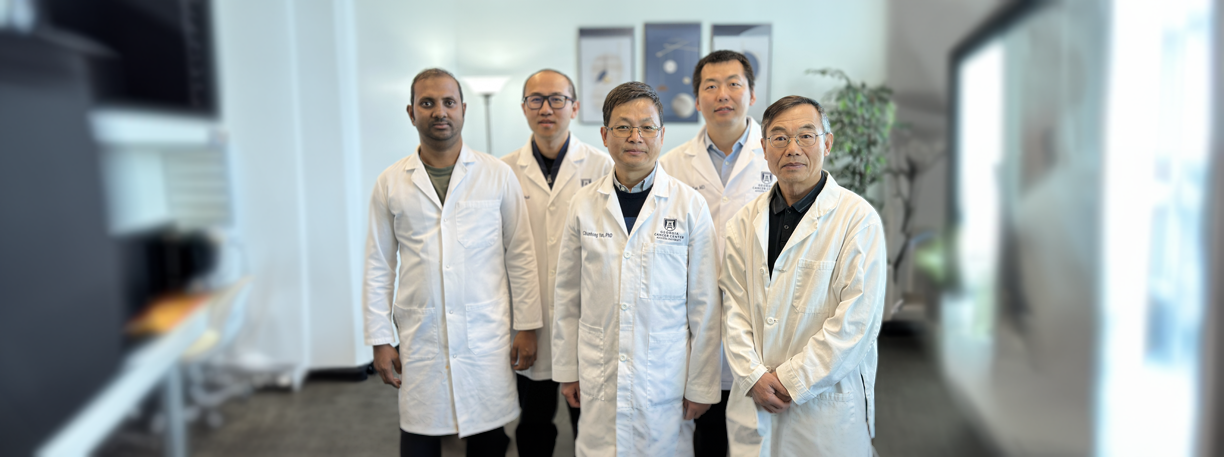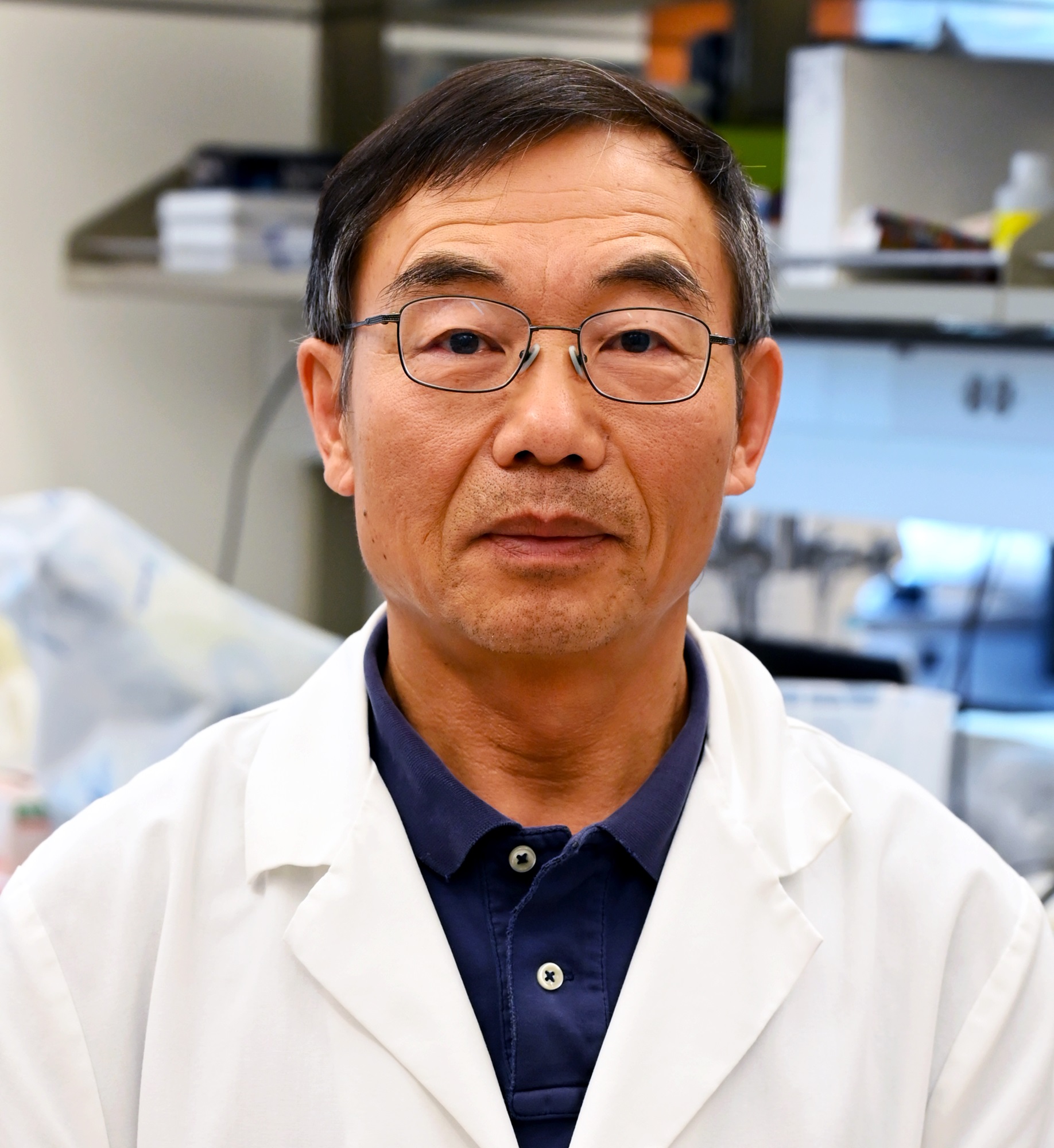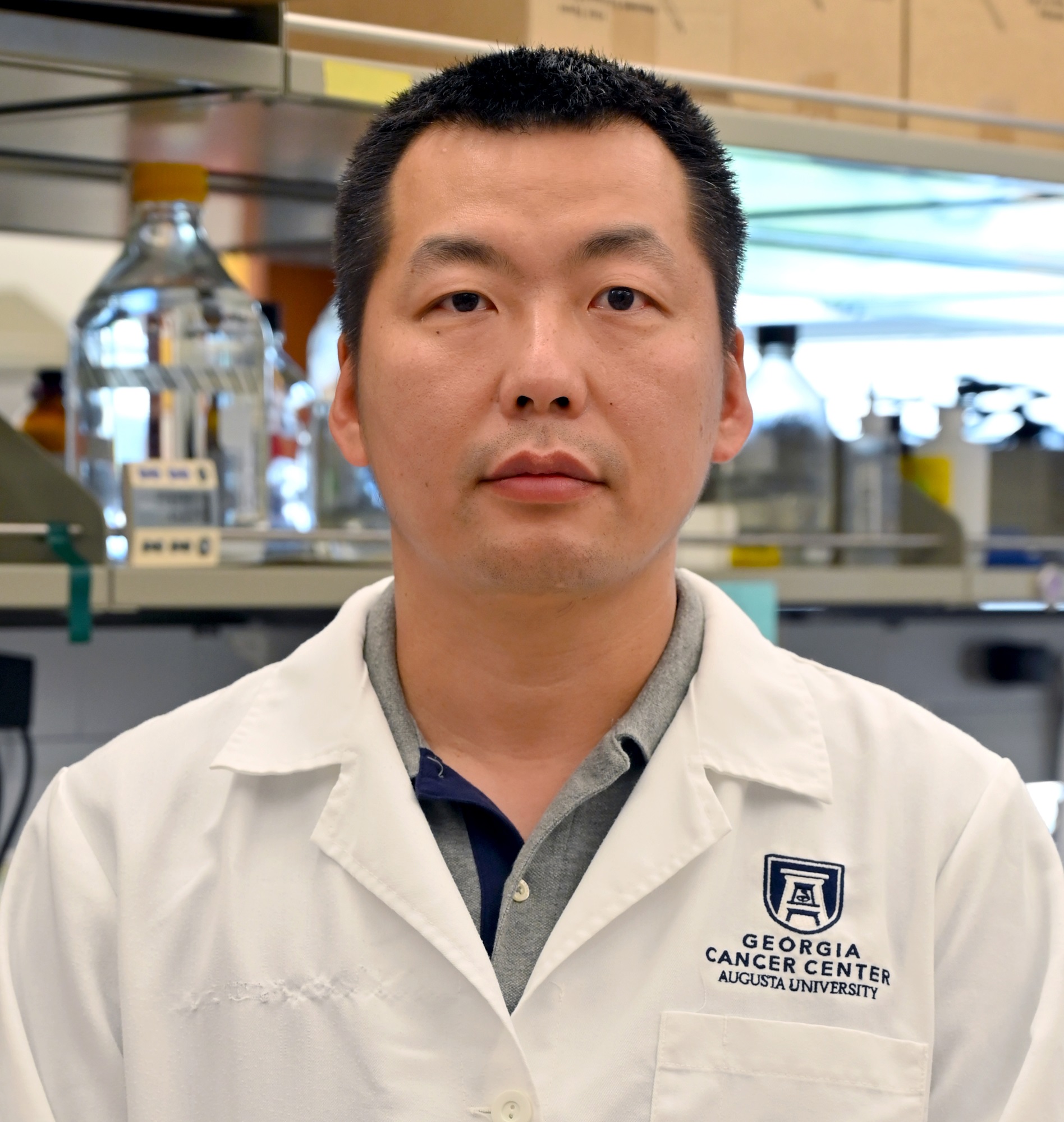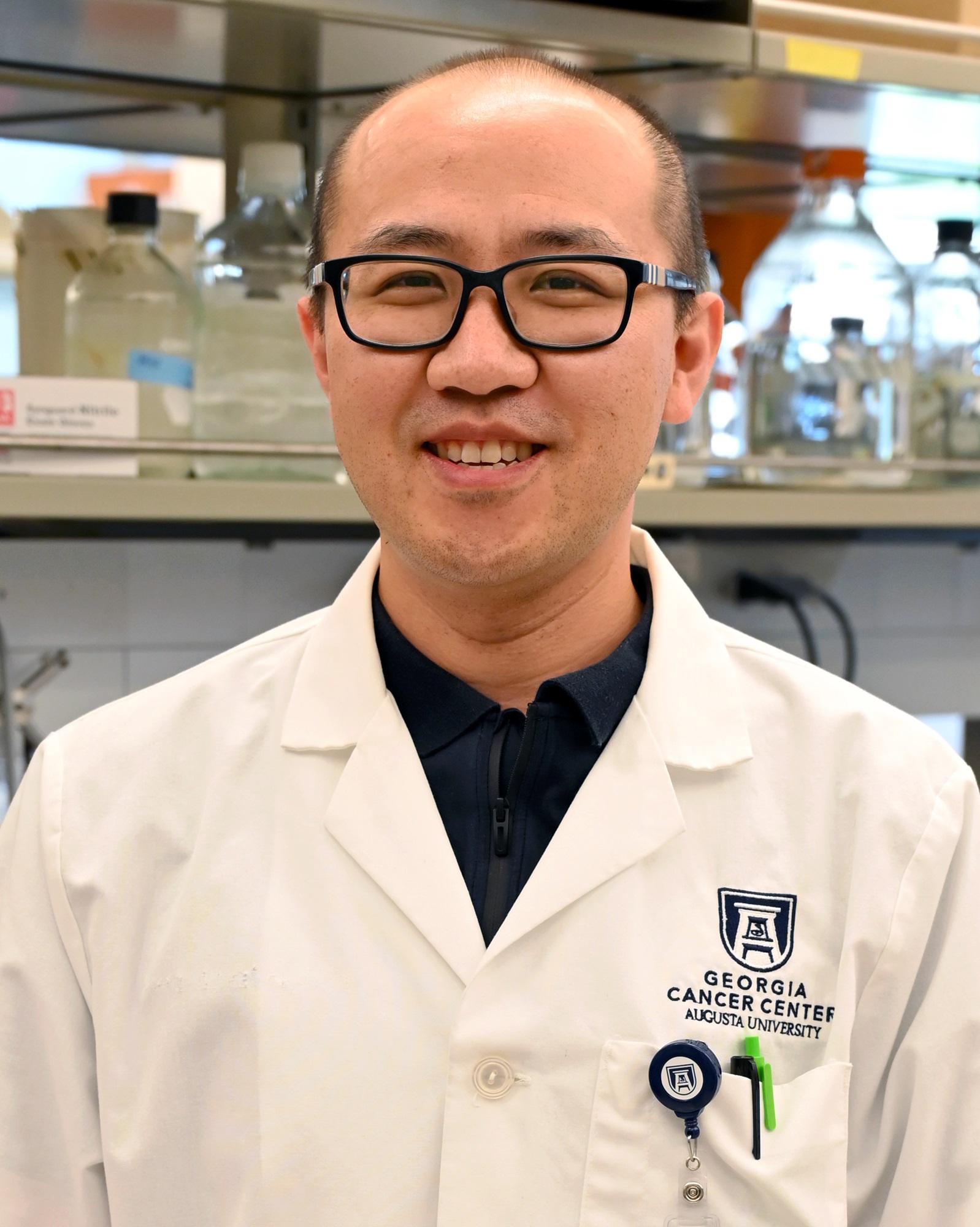
The Yan Lab
Chunhong Yan, PhD
Professor, Biochemistry & Molecular Biology

Jump to: Research Summary Research Interests Selected Publications Research Team
Contact Us
The Chunhong Yan Lab
Health Sciences Campus
GCC - M. Bert Storey Research Building
1410 Laney Walker Blvd., CN-2125N2
(706) 721-0099
Research Summary
The Yan Laboratory is interested in elucidating and therapeutically targeting transcriptional regulatory networks in cancer. We investigate a protein-protein interaction network centered on a common stress-responsive transcription factor ATF3, and aim at understanding how this network regulates the tumor suppressor p53, the cell’s response to DNA damage and metabolic stress, and the pathways contributing to the development of cancer. We also employ genome-editing tools to build innovative drug-screening platforms for the development of novel therapeutics for advanced cancer.
Research Interests
Regulation of the DNA damage response
The tumor suppressor p53 mediates the cellular response to DNA damage, and safeguards the integrity of the genome. The activity of p53 is mainly regulated by MDM2, a E3 ubiquitin ligase which catalyzes ubiquitination and subsequent degradation of the tumor suppressor. While we are the first to demonstrate that ATF3 can regulate cellular functions independent of its transcriptional activity, our research has discovered novel mechanisms mediated by ATF3 that serve to fine tune the p53 activity in response to oncogenic challenges. We found that ATF3 binds both p53 (at the C-terminus) and MDM2 (at the RING domain), and functions as a preferred MDM2 substrate thereby competitively blocking MDM2-mediated ubiquitination and degradation of p53. Our research also unveils that ATF3 can bind Tip60 and stabilize the lysine acetyltransferase, leading to activation of the ATM signaling, which in turn activates p53 in the DNA damage response. Using genetically-engineered mouse models, we demonstrate that Atf3 deficiency promotes genomic instability and spontaneous tumorigenesis in mice. This line of genetic evidence highlights the importance of ATF3 in the regulation of p53 and the DNA damage response.
Mechanisms for the Suppression of Prostate Cancer
The growth of prostate cancer cells is dependent on oncogenic signaling mediated by the androgen receptor (AR) and PI3K/Akt. We discovered that ATF3 can bind to AR and repress androgen signaling by disrupting the AR intra-molecular interaction and preventing AR from binding to target genes. Using a Pten prostate-specific knockout mouse model, we further found that ATF3 represses Akt signaling and suppresses prostate tumorigenesis induced by common Pten loss. Ongoing studies are designed to further explore the role of ATF3 in the suppression of prostate cancer, with a special emphasis on the growth of castration-resistant prostate cancer.
Transcription-targeted cancer therapy
While transcription is generally considered undruggable due to the lack of interface for targeting by small molecules, we continue our long-time endeavors in the development of effective, cost-efficient platforms for high-throughput searching for transcription-targeted anti-cancer drugs. We developed a toolkit based on the Flp-in technology, and demonstrated its utility in rapid generating bioluminescent reporter assays devoid of epigenetic silencing caused by flanking chromatin. Emerging genome-editing technologies, including the CRISPR/Cas9 system, are also applied to develop more reliable reporter assays for high-throughput drug screening. With these new platforms, we identified one of the first long-sought MDMX (MDM4) inhibitors that can activate p53 for the treatment of cancer. Several other lead compounds targeting Skp2 expression and cell metabolism have also been identified, and undergo further development as novel therapeutics for advanced cancer.
Selected Publications
Yan C, Lu D, Hai T, Boyd DD. (2005) Activating transcription factor 3, a stress sensor, activates p53 by blocking its ubiquitination. EMBO J 24(13): 2425-2435
Yan C, Boyd DD. (2006) Histone H3 acetylation and H3 K4 methylation define distinct chromatin regions permissive for transgene expression. Mol Cell Biol 26(17): 6357-6371
Mo P, Wang H, Lu H, Boyd DD, Yan C. (2010) MDM2 mediates ubiquitination and degradation of activating transcription factor 3. J Biol Chem 285(35): 26908-26915
Wang H, Ma X, Ren S, Boulamwini JK, Yan C. (2011) A small-molecule inhibitor of MDMX activates p53 and induces apoptosis in cancer cells. Mol Cancer Ther 10(1): 69-79
Wang H, Jiang M, Cui H, Chen M, Buttyan R, Hayward S, Hai T, Wang Z, Yan C. (2012) The stress response mediator ATF3 represses androgen signaling by binding the androgen receptor. Mol Cell Biol 32(16): 3190-3202
Wei S, Wang H, Lu C, Malmut S, Zhang J, Ren S, Yu G, Wang W, Tang DD, Yan C. (2014) The activating transcription factor 3 protein suppresses the oncogenic function of mutant p53 proteins. J Biol Chem 289(13): 8947-8959
Cui H, Guo M, Xu D, Ding Z, Zhou G, Ding H-F, Zhang J, Tang Y, Yan C. (2015) The stress responsive gene ATF3 regulates the histone acetyltransferase Tip60. Nat Commun 6:6752 doi:10.1038/ncomms7752
Lang L, Ding H-F, Chen X, Sun S-Y, Liu G, Yan C. (2015) Internal ribosome entry site-based bicistronic in situ reporter assays for discovery of transcription-targeted lead compounds. Chem Biol (Cell Chem Biol) 22 (7): 957-964
Wang Z, Xu D, Ding H-F, Kim J, Zhang J, Hai T, Yan C. (2015) Loss of ATF3 promotes Akt activation and prostate cancer development in a Pten knockout mouse model. Oncogene 34(38): 4975-4984
Wang Z, Kim J, Teng Y, Ding H-F, Zhang J, Hai T, Cowell JK, Yan C. (2016) Loss of ATF3 promotes hormone-induced prostate carcinogenesis and the emergence of CK5+CK8+ epithelial cells. Oncogene 35(27): 3555-3564
Cui H, Li X, Han C, Wang Q-E, Wang H, Ding H-F, Zhang J, Yan C. (2016) The stress responsive gene ATF3 mediates dichotomous UV responses by regulating Tip60 and p53 proteins. J Biol Chem 291 (20): 10847-10857
Zhao J, Li X, Guo M, Yu J *, Yan C. (2016) The common stress responsive transcription factor ATF3 binds genomic sites enriched with p300 and H3K27ac for transcriptional regulation. BMC Genomics 17: 335
Wang Z, He Y, Deng W, Lang L, Yang H, Jin B, Kolhe R, Ding H-F, Zhang J, Hai T, Yan C. (2018) Atf3 deficiency promotes genome instability and spontaneous tumorigenesis in mice. Oncogene 37(1): 18-27
Wang L, Liu Y, Du T, Yang H, Lei L, Guo M, Ding H-F, Zhang J, Wang H, Chen X, Yan C. (2020) ATF3 promotes erastin-induced ferroptosis by suppression system Xc-. Cell Death Diff 27: 662-675
Li X, Guo M, Cai L, Du T, Liu Y, Ding H-F, Wang H, Zhang J, Chen X, Yan C. (2020) Competitive ubiquitination activates the tumor suppressor p53. Cell Death Diff 27(6): 1807-1818
Li X, Gracilla D, Cai L, Zhang M, Yu X, Chen X, Zhang J, Long X, Ding H-F, Yan C. (2021) ATF3 promotes the serine synthesis pathway and tumor growth under dietary serine restriction. Cell Rep 36(12): 109706
Hawsawi O, Xue W, Du T, Guo M, Yu X, Zhang M, Hoffman PS, Bollag R, Li J, Zhou J, Wang H, Zhang J, Fu Z, Chen X, Yan C. (2025) Mitochondrial uncouplers inhibit oncogenic E2F1 activity and prostate cancer growth. Cell Rep Med 6(1): 101890
Research Team



Cuifen Zhang
Reducing the Burden
The Georgia Cancer Center at Augusta University is dedicated to reducing the burden of cancer in Georgia and across the globe through superior care, innovation, and education. Through unprecedented expansion, the Georgia Cancer Center is providing access to more first-in-the-nation clinical trials, world-renowned experts and life-saving options.
Follow the Georgia Cancer Center